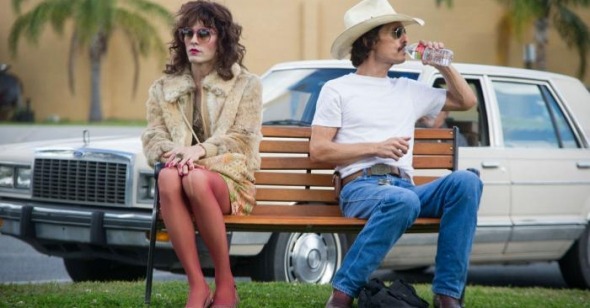A preface, as always, is in order. Because Reverse Shot is not made up of weekly film critics, we don’t have to see the unspeakable garbage that explodes like diarrhea on 3000-plus screens every week. The latest installments of Die Hard, Grown-Ups, The Hangover, and the like therefore went mercifully unseen by most of us. Thus our annual Offenses list is never designed to be a definitive compilation of the truly “worst” movies of the year, but rather a reminder of the handful of movies that lodged in our heads like bundles of earwig larvae. And, yes, these often include pandering awards-bait, because there is nothing more offensive to true cinema lovers than insincerity of purpose. In a sense, these movies, high and low, American and international, are generally more horrifying than any bottom-of-the-barrel title like, say, Hansel & Gretel: Witch Hunters, because we don’t forget them. Years later we’re still trying to scrape the muck off our skin left by The Lovely Bones and wishing we’d never seen (or heard) the moronic musical Nine. Let’s hope this year’s cream-of-the-crap isn’t quite as memorable. —MK & JR
[Capsules by Julien Allen, Ashley Clark, Leo Goldsmith, Eric Hynes, Michael Koresky, Violet Lucca, Adam Nayman, Nick Pinkerton, Jeff Reichert, Justin Stewart, and Elbert Ventura.]
Dallas Buyers Club
Never trust a film that applauds its own protagonist. When Woody Allen ended his bitterly self-incriminating black comedy Deconstructing Harry with his supporting cast showering Allen stand-in Harry Block with warm applause, it was meant as a devastating auto-critique, as a simultaneously poignant and pathetic ploy to engineer his own affirmation. Yet when Jean-Marc Vallée peddles a similar scene in his queasily crass Oscar-bait entertainment Dallas Buyers Club, it’s meant as an unironic prompt for the audience to join in: onetime homophobic lowlife Ron Woodroof (Matthew McConaughey) has become a trailblazin’ HIV-positive Robin Hood of experimental AIDS treatment drugs, and lest you think there’s any gray area left for whitewashing, better echo his approbating onscreen comrades and sanctify. A true life Hollywoodization in the Erin Brockovich mold, Craig Borten and Melisa Wallack’s script takes a one-of-a-kind, scarcely told story of AIDS-drug smuggling in Texas and turns it into every single unlikely-hero yarn you’ve ever seen—goosed with the equally tired spectacles of a major movie star’s attention-sucking self-emaciation (McConaughey), and a minor star’s “courageous” supporting turn as a trans woman (Jared Leto). That Leto’s amateurishly affected, uncertainly accented, offensively beautified performance has become a foregone Oscar winner shows how advantageous it remains for famously straight dudes to “go gay” (they’re acting, get it?) and by comparison ought to retroactively earn Philip Seymour Hoffman six or seven statuettes for his analogous drag show in 1999’s Flawless (for at least Hoffman is an actor). Vallée and co. aren’t responsible for the fact that Hollywood has yet to make an ACT UP–era movie with a gay protagonist, but they’re quite responsible for concocting Leto’s fictional Rayon (the only queer character we spend any time with) for the sole purposes of legitimizing our hetero hero—watch the ’phobe reveal a heart of gold in 3…2…1—and (spoiler alert only if you’ve never seen a movie) tragically dying so that said hetero hero might live more heroically. What kind of culture looks back at the treatment-deficient years of the AIDS crisis and thinks that there’s a heartwarming redemption story in it, a Blind Side meets Archie Bunker dramedy just waiting to happen? The kind of culture that avidly rewards such thinking. —EH
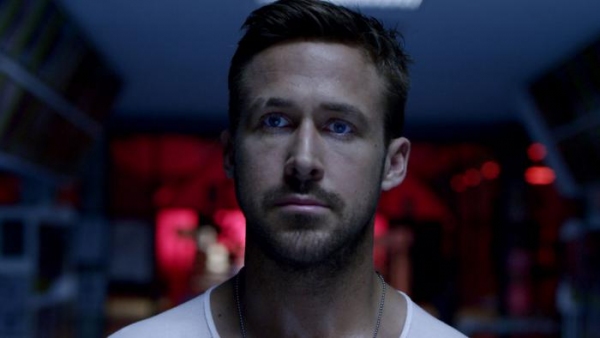
Only God Forgives
Some things really do take a lot of forgiving. The few of us who imagined that 2011’s retro-cool Cannes-winner Drive might have constituted the ne plus ultra of hollow homage cinema were in for an unpleasant shock in 2013. The commercial success of Drive (a film made under the gross misapprehension that B-movies are supposed to be dumb) released self-confessed “pornographer” Nicolas Winding Refn to indulge his grubbiest and most joyless fantasies for our apparent delectation. Anyone seduced by the flatulent over-direction—Refn’s auteurist ambitions are characterized by deliberately slow dream sequences, expertly and meaninglessly shot by Eyes Wide Shut cameraman Larry Smith—can doubtless find something about “hell on earth” or “East-West relations” to ascribe all this punishment to, but there’s really no point. Refn isn’t lecturing us like Haneke or provoking us like Tarantino—he just really seems to enjoy torture and dismemberment and it pleases him to let us know this. Well, whatever turns you on, mate. Only God Forgives stars Ryan Gosling, laboriously pushing to the tilt the taciturn twat routine from Drive with which he now appears to have decided to define his career. While on a revenge mission in Bangkok, he reluctantly takes on a brutally nasty cop who did something very unpleasant to a man who viciously murdered Gosling’s brother, who himself did something unspeakable to a young prostitute who . . . okay, you get the idea. Suffering terribly by comparison with everyone he rips off (David Lynch, Wong Kar-wai, Jean-Pierre Melville), Refn is no action director, and the combat scenes are less about fighting than succumbing, culminating in a sequence of such moronic extremity that—special interest audiences excepted—sheer abjection is the only morally sensible response. Kristin Scott Thomas’s bottle-blond bitch-shtick might have come as a surprise to some, but in one respect her career manages to be entirely consistent: in her unsurpassable ability to sniff out a rancid script and immediately sign up for it. Refn ascribes this year’s Cannes walkouts to the fact that his cinema really affects people, for better or for worse. He’s right to some extent, but the strongest reaction I felt to the film wasn’t boredom with the relentless neon-lit corridor sequences, or revulsion at the umpteenth sectioning, but an overwhelming desire to be anywhere other than in the cinema. And that’s pretty unforgivable. —JA
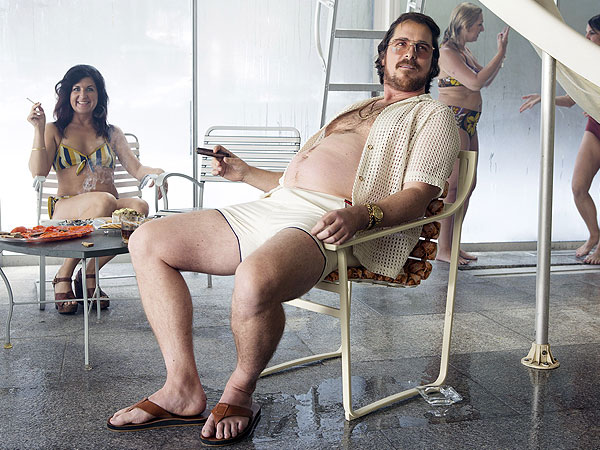
American Hustle
David O. Russell’s American Hustle has a weighty theme. It’s hard to miss this theme, because it’s repeated quite often—in dialogue, in the voiceover by Christian Bale’s improbably named, improbably accented scam artist Irving Rosenfeld. The theme is that everyone in America has a con to run, even if they’re only running it on themselves. Don’t worry about missing this kernel of wisdom if you have to take a bathroom break; the point will be repeated a lot, because everybody talks a lot in American Hustle: Rosenfeld, his wife (Jennifer Lawrence), his partner (Amy Adams, unforgivingly photographed), and the FBI agent (Bradley Cooper) who has the bright idea of using them all as bait to chum for bigger fish. If acting was sold by the pound, the movie would be a big bargain-store crate. The frame is no less busy than the actors, and you’re always just around the corner from a significant-seeming dolly shot or the camera dropping to pick up a character’s gesticulating hands. It’s a shoo-in for Most Actor and Most Director buzz, feeling more like a polyester “Disco Inferno” theme party than any habitable, historically feasible 1970s, and features Robert De Niro in the most depressing cameo in film history. —NP
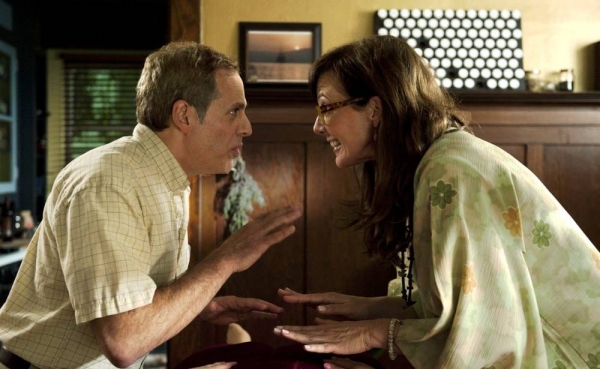
Touchy Feely
Like Humpday before it, Touchy Feely is predicated on a sense of grossness. In that film, it was the thought of two hairy bros having sex; here, a pot-smoking masseuse (Rosemarie DeWitt) suddenly develops a phobia of skin after really, really looking at it. (Which totally doesn't make any sense because Bioré Pore Strips are way worse.) But grosser still is the fact that the box office receipts for Lynn Shelton’s movies routinely double—or, in the case of Your Sister’s Sister, tredecuple—their minuscule production costs. At least, that is, until this year’s painfully unfunny, unenlightening Touchy Feely. While conspiracy theorists point to the not-so-secret dysfunctions and nepotism of the U.S. festival circuit, the Sundance machine runs on cash, not vanity, so there’s a limit to how many times they’ll go to bat for even the finest pedigreed indie royalty. Shelton has been, thus far, the indie equivalent of Jason Friedberg and Aaron Seltzer (those guys behind the “[Genre] Movie” parodies), who can economically churn out lo-fi versions of Hollywood dramedies. And not unlike Friedberg and Seltzer, the non-fiduciary component of Shelton’s success has to do with one “controversial” element in her elevator pitch—grief sex, gay for pay—that is watered-down in the final product. In Touchy Feely, the OMG factors include Scoot McNairy (DeWitt’s commitment-phobe beau) lusting after Ellen Page and Josh Pais (a poor man’s Ben Stiller) developing a magical ability to heal people with a rare jaw ailment. Meanwhile DeWitt functions as a Katherine Heigl stand-in, all bland stares and flat diction, and Allison Janney just undersells herself. But aside from their fumbling deliveries, arrested development, and vanilla, half-baked “conflicts,” the denizens of Touchy Feely are empathy-proof, designed as conduits for smug one-liners and disdainful laughs. Twenty years of Miramaxification has yielded cynical films that get funded for cynical reasons. Another snide, Shelton “dark comedy” with Keira Knightley and Sam Rockwell is coming later this year. —VL
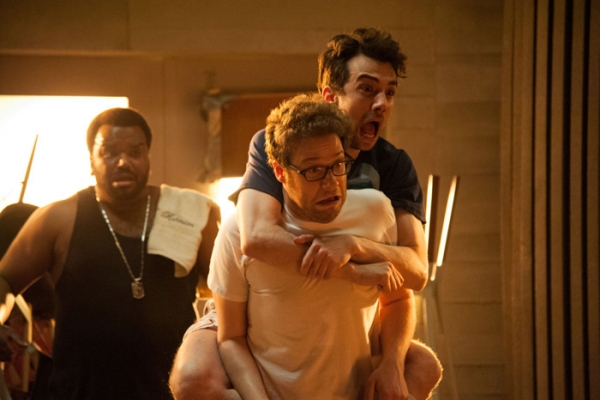
This Is the End
We’re at the point now where even the most negligible pot puffs of “ideas” from any of the senior members of the “Apatow Camp” can be indulged on a multi-million-dollar scale, and hyped promises of an ingenious, meta twist on the usual will dupe me and other sheeples to continue to pay for our curiosity. I say pot puffs, but I’m dubious how much Seth Rogen really smokes, or if his fixation on marijuana in his comedy is just to boost his baked-Peter-Pan brand. This Is the End supports the notion that even if he and cowriter/director Evan Goldberg don’t write stoned, heavy use may have impaired their ability to differentiate between a clever idea for a 20-minute sketch and a concept able to sustain 106 minutes. The resultant grating jumble is the mash-up of self-ribbing show-folk satire and Left Behind-style rapture spectacle for which no one was asking. It’s a shame the latter dominates the running time; even though the “let’s laugh at ourselves” early stuff, with bros like James Franco and Michael Cera tweaking their celeb personas, only furtively serves as self-congratulation, it beats the endless, strident apocalypse scenes, with swinging CGI demon cocks, rape gags, and Emma Watson, as the most obligatorily tossed-in female of the year. Its cleverness spent about a half-hour in, This Is the End screams and impales its enervating way to a final admission of defeat, a “LOL remember the 90s?!” Backstreet Boys cameo jam. —JS

The Counselor
“Truth has no temperature,” Cameron Diaz assures us in The Counselor, but somehow Ridley Scott’s unpersuasively grave thriller about a Mexican drug cartel ruthlessly knotting the loose ends of a botched deal inspired some of the most overheated film-critical rhetoric of 2013. In a year where the Village Voice’s annual Best Film Poll included a “Movie Everyone Is Wrong About” category, the attempted rehabilitation of a film as obviously dreadful as The Counselor (which got three votes, the same number as The Lone Ranger and Pain and Gain) shouldn’t be surprising; the temptation to overpraise a consensus punching bag is an irresistible one (says the writer who has a book on Showgirls coming out in a couple of months). If some took better swings than others, the effect, both cumulatively and individually, feels a bit like shadowboxing. A portentously stylized designer item whose theme—“Capitalism Sux”—could be scrawled easily on a cocktail napkin with room to spare, The Counselor features alongside its depressingly obvious visual metaphors and gratingly faux-astere brutality a two-for-one special of alternately neurasthenic and embarrassingly over-cranked acting: understandably tuckered out after his 12 Years a Slave pratfalls, Michael Fassbender gives perhaps the first truly lazy performance of his career, while Diaz—playing a distaff version of Cormac McCarthy’s stock-in-trade monstrous-cipher antagonists, this one with a cheetah fetish—gives ’er with the intensity of a true believer. That commitment is the hallmark of a true professional, and it’s too bad that Diaz ends up as the writhing, mugging emblem of The Counselor’s inherent ridiculousness when she’s just doing her level best—something that none of the other major collaborators here could claim with a straight face. —AN
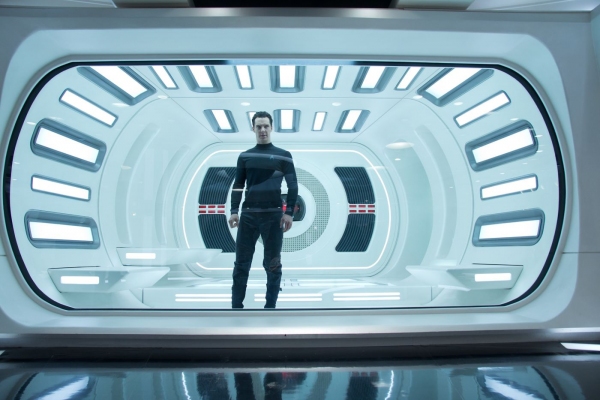
Star Trek Into Darkness
Star Trek has always been given too much credit for its progressive politics—the series is, after all, about a militarized intergalactic UN run largely by American guys. And yet J.J. Abrams’s suped-up and dumbed-down 2009 reboot still strove for an updated (if not exactly enlightened) take, giving characters like Uhura and Sulu prominent, borderline human roles and undermining, however tentatively, the square-jawed vanity of everyone’s favorite space captain. The inevitable sequel, which comes laden with import in its grammatically puzzling subtitle Into Darkness, takes any good will banked from the first film and shits all over it. Beginning with an ersatz Indiana Jones romp through the exotic wilds of a planet of spear-chucking alien primitives, the film soon reverts to the usual narrative triangulation of best bros in space, as Kirk, Spock, and McCoy wax poetic over their loyalty to each other while battling a mysterious evildoer—mysterious because he is Benedict Cumberbatch, evil because he has a British accent—and, but for some Scottie quips and a striptease from new blonde tagalong Alice Eve, largely ignore everyone else. Of course there’s still plenty of Trekkery, for whatever that’s worth, starting with the unsurprising reveal that we are dealing with none other than Khan himself!, but this perverse, pervasive obsession with franchise reflexivity gives the film all the focus and subtlety of a Family Guy episode, culminating in a disastrous, zero-risk recasting of Wrath of Khan’s iconic Spock-icide scene. This sort of misplaced fan service, all winky-winky left-field insertions of the usual canned McCoyisms and Scottie exclamations, backfires here even more than one might expect, especially when the same logic of pastiche is applied to recent history: the film ends with a by-now rote recreation of 9/11 as fun-ride/numbingly genocidal climax, in which Khumberbatch crash-lands a giant spaceship into San Francisco—and lives! —LG
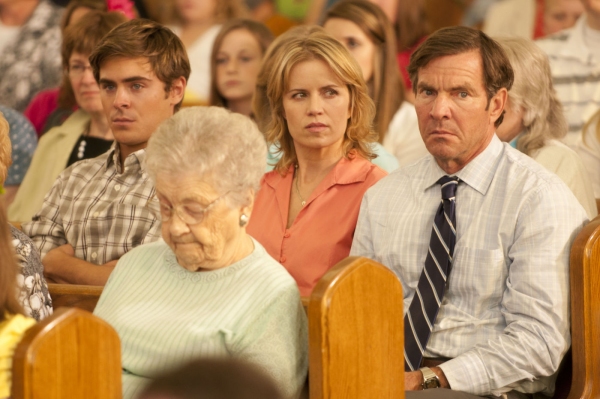
At Any Price
There have been some fairly harrowing spectacles in the terrible movies of 2013: Ryan Gosling playing constipated again while rummaging through his dead mother’s womb in Only God Forgives; Pedro Almodóvar revolving another plot around—and wringing kooky comedy from—unconscious rape in the unpersuasively titled I’m So Excited; Rob Zombie trying to convince us a silly little latex demon is more than a silly little latex demon because it’s accompanied by a swell of Bach in The Lords of Salem. But nothing was more jaw-dropping than Dennis Quaid’s bizarre contortions as farmer Henry Whipple in At Any Price. At first, the manic, overanimated desperation with which Quaid telegraphs his character’s forced folksiness (he’s like early Jim Carrey, if less subtle) may seem incongruous with the reserved drama at hand. Yet as the plot of Ramin Bahrani’s agonizingly stupid blood-in-the-heartland saga unfolds, his clownishness starts to fit right in. What at first appears to be a sympathetic portrait of a family struggling to meet the demands of the agricultural industry gradually reveals its true colors, ending up as a distasteful, contemptuous portrait of middle-American unscrupulousness. As Henry’s rebellious kid, who’d rather be a NASCAR driver than follow in the footsteps of sad-sack seed-seller Pop, Zac Efron flexes his golden biceps beautifully and otherwise looks hopelessly lost. Quaid’s earnest overacting and Efron’s befuddlement hardly help the film blossom convincingly into the tragic tale of murder and betrayal it becomes following a third-act turn that beggars belief. (This is then followed by a final Lady Macbeth-style twist that outdoes even Laura Linney’s goofy coda in another strained masculine melodrama, Mystic River.) One might be surprised to realize that this was directed by Bahrani, whose Man Push Cart and Chop Shop have been viewed by many as exemplars of contemporary American independent cinema. Yet Bahrani’s really just trading one set of received aesthetics for another: from the dispassionate documentary feel of the new “neo-neorealism” (as dubbed by A. O. Scott) to the smoothly anonymous look and texture of the American middlebrow. Whether or not one admired his former work, At Any Price is an astonishing face-plant, as dramatically inept as it is bereft of humanism. Is this Hell? No, it’s Iowa. —MK
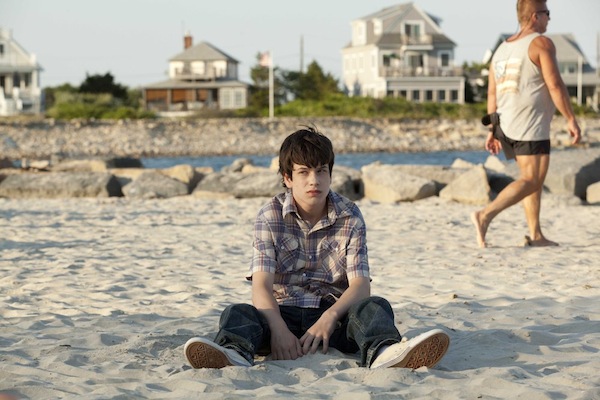
The Way Way Back
Raise your hand if you love soulless, warmed-over, coming-of-age summer movies! (Dear majority of the American film critical establishment: put your hands down, you’re embarrassing yourselves.) Now that mainstream filmmaking has largely given up the ghost on providing entertainments that aren’t drenched in irony or reliant on references to other, better films to produce any sort of frisson (bonus points for humping American movie tropes from the seventies and/or drizzling eighties pop standards on your soundtrack—“Kyrie” anyone?), prepackaged goods the likes of The Way Way Back shouldn’t cause the bat of an eyelash. But even with all the competition fighting to scrape the bottom of the barrel, this crap-bag should make one want to put a fist through the screen. For special satisfaction, throw a punch during one of the many close-ups of lead Liam James, who, as a young loser self-actualizing via a summer job at a water park, delivers a comprehensive study in constipation. Drably written and “directed” by the team of Jim Rash and Nat Faxon (“Rash & Faxon” has all the ugly ring of a medieval torture practice or an Irish breakfast offal), The Way Way Back limps along, so cynically confident we all know how this is all supposed to go that it never feels compelled to offer us anything beyond faint echoes of situations and characters we’ve seen many times before. Overt copycatting in indie-mainstream film isn’t new, but the smug gusto that this pair exhibits in their headlong rush to deliver the next big ingratiating summertime crowd pleaser offends deeply—they’re not even trying to win their audiences over. At 21 million in box office and counting, apparently they didn’t have to. Experiencing The Way Way Back makes one long for the halcyon days of Adventureland, which looks practically like Amarcord in comparison. —JR

The Family
When Bronx tunesmith Billy Joel recently announced his intention to play Madison Square Garden once a month until he bid “Goodnight Saigon” to planet Earth, my first thought was this: at least Robert De Niro will soon have some company inside the bubble of New York artistic purgatory. The narrative of De Niro’s decline—both as an actor and in his role choices—is now so oft-told as to be met with an automatic shrug, but it’s also inarguable. Aside from his (overrated) Oscar-nominated turn in Silver Linings Playbook, the last few years make for unedifying reading: Little Fockers, Killer Elite, The Big Wedding, Grudge Match . . . Yet little could have prepared me for the ordeal of witnessing De Niro languish in the noxious depths of Luc Besson’s The Family. In this adaptation of Tonino Benacquista’s novel Malavitas, De Niro sighs and shambles along as Giovanni, a Brooklyn mobster hiding out in a village outside Normandy with his sociopathic wife (Michelle Pfeiffer, somnambulant) and their two repellent, hyperviolent children. The ensuing plot is too ludicrously convoluted to detail here, but the Parisian Besson is evidently less interested in crafting a coherent narrative than granting his psychotic central family the opportunity to graphically and repeatedly beat up on a cavalcade of dismayingly broad provincial French stereotypes. As the unpalatable elements pile up—the gratuitous violence, the tortured, sub-Tarantino dialogue—one wonders whether Besson has simply lost his mind. How else to explain the horrifying match cut which takes us from Giovanni’s teenaged daughter Belle (Diana Agron) climaxing while losing her virginity, to a close-up of Giovanni orgasmically gorging on pasta? Simultaneously baffling and repugnant, this sudden moment succinctly captures The Family’s benighted spirit, though poor Agron is irresponsibly sexualized by Besson throughout—this is perhaps a holdover from his extremely dubious objectification of a prepubescent Natalie Portman in 1994’s The Professional. But the nadir is reserved for De Niro alone. Toward the end, film-lover Giovanni arrives as a guest of honor at the local film club to share his post-screening thoughts on—wait for it—Martin Scorsese’s Goodfellas, which arguably contains De Niro’s last great performance. It’s death by meta, both narratively nonsensical and unfathomably cruel to its star, who is literally forced to confront his glorious past. —AC

Admission
We are living, we are told, in a “Golden Age of Television”—and the movies, by definition, have suffered by comparison. That such nonsense continues to be peddled is especially galling in a year such as this, when the movies were as good as they’ve been this millennium. But let’s give the TV triumphalists this: when it comes to comedy, they may have a point. One need only submit the career of Tina Fey as evidence. The former head writer of Saturday Night Live has developed a persona that’s unapologetically smart and feminist and yet deft enough to poke fun at being both. On television, she gave us the best political impression of the era and one of the great network comedies of the decade. At the movies, here are her star vehicles to date: Baby Mama, Date Night, now Admission. Of this latest, there is little to say. Our college-admissions process seems a promising target for biting satire. Our wait continues. Too insipid to inspire hatred, this Paul Weitz-directed comedy covers familiar thematic ground for Fey—the career, can’t-have-it-all woman—but sees her stretch her acting muscles. We admire the effort, but need the result be so blah? Mainstream American film comedy in the last decade has been a long-running series on one subject: the life and times of bros. Which is why we root for Fey to succeed at the multiplex. But a couple more duds and we may have to concede that on this count, TV just may have the edge. —EV
